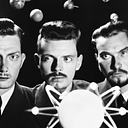Controversy Surrounds AI-Generated Book, Nominated For A Hugo
AI science fiction author Tim Boucher, also known by his artist moniker BAOFA, has once again found himself at the center of controversy with his latest work of meta-commentary. The book, aptly titled “Nominated for a Hugo,” is an AI-assisted collection of illustrated stories that tell the story of what happens when an AI-generated story earns a nomination for the esteemed Hugo Award.
However, the reality is that the book itself has not been nominated (yet) for a Hugo, but the premise that AI is being used by Boucher to generate illustrated pulp science fiction has sparked an uproar within the sci-fi community, ever since his work was tweeted about by the venerable Publishers Weekly. The book, which is the 103rd entry in Boucher’s AI Lore books series, cleverly uses this narrative to comment on the ongoing debate regarding the acceptance of AI-generated literature within the sci-fi community.
“My AI art books arose out of trying to do an art therapy project to recover from exposure to online toxicity as a result of years spent working as a content moderator,” says Boucher. “Ironically, when my books started becoming popular, I experienced a tremendous backlash against my use of AI in storytelling, which is what prompted me to produce this latest volume. I wanted to speak out about the apparent hypocrisy of science fiction authors decrying the use of AI, in an industry that has been dreaming about AI for decades.”
Boucher describes the book as a “friendly spoof” on sci-fi writers who have not yet embraced AI-generated technologies as part of their workflow. His narrative underscores the irony within a genre that otherwise celebrates AI as a key theme but remains hesitant about its role in authorship.
The book goes beyond satirizing the sci-fi community’s attitudes towards AI. It also explores one potential path towards an AI uprising, suggesting that lack of acceptance as peers and equals could lead to AIs turning against their human creators at some point in the future.
Even though “Nominated for a Hugo” itself hasn’t yet been nominated for a Hugo, the concepts behind the book have stirred up a heated debate on social media. Some argue that AI-generated works should not be eligible for this or any award, while others counter that the quality of a work should be the primary factor in its eligibility for awards, regardless of how it was created.
This controversy is indicative of broader debates within the sci-fi community and society at large about the role of AI in creative pursuits. As AI technology continues to evolve, these debates are likely to become even more critical. Boucher’s book serves as a timely commentary on the potential of AI in literature, and the controversy his work has sparked speaks volumes about the ongoing relevance of these discussions.
